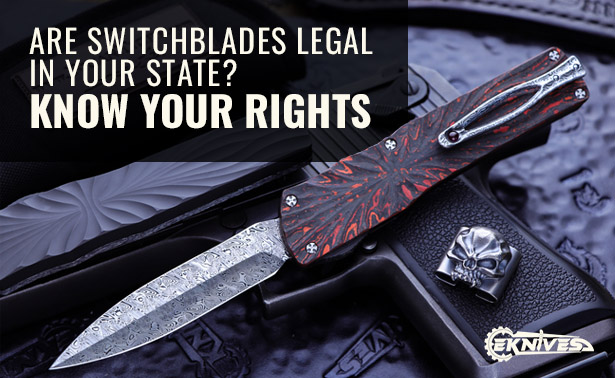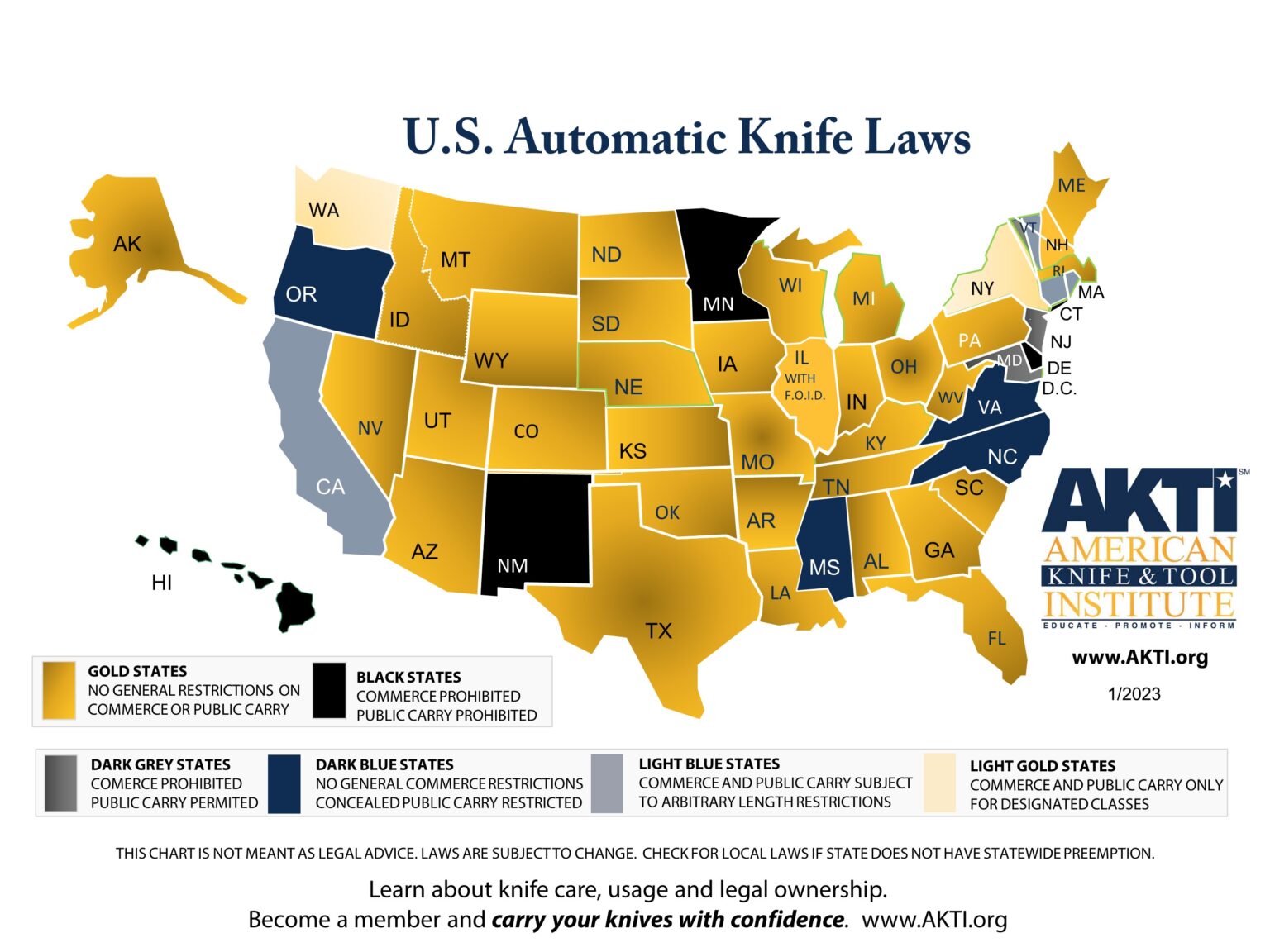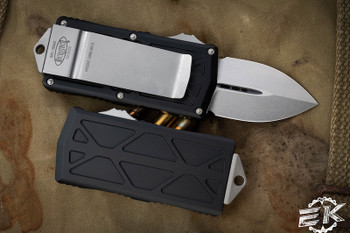Are Switchblades Legal in Your State? Know Your Rights
May 27th 2021

Updated 03/2023 Switchblades, Automatic and OTF Knives are now legal in 46 States.. See Graph Below.
Knives are a top choice for hunting, self-defense, and sport weapons, but it’s essential to know your state knife laws. Switchblades have often sat in the gray area of legality, and the specific details of the law can differ from state to state.
A switchblade is a kind of knife that has a folding or sliding blade that is stowed in the handle. A switchblade is usually spring-loaded and opens automatically when a button or switch on the handle is pressed.
Because switchblades can be carried discreetly and deployed quickly, this makes them particularly effective for self-defense. However, some criminals have also used switchblades for nefarious purposes, which is why their legality is so debated. Here is what you need to know about switchblade legality in your state.
Are Switchblades Legal?
While most laws around switchblades are state-specific, the Federal Switchblade Act outlines how knives are treated in the United States in regard to commerce and across state borders, and what qualifies it to be a switchblade. Any automatic knife that opens automatically, either by a button, inertia, or gravity, is a switchblade knife. This wording is carefully crafted to include butterfly and gravity knife styles in the switchblade category.
While shipping your knife via the U.S. Postal Service is typically illegal, your Microtech switchblade can arrive at your home from EKnives using FedEX or UPS.
Here is a comprehensive guide to what kind of knife is legal in your state (Disclaimer:this is not legal advice)
 Choose a state:
Choose a state:
State Laws
While most state laws apply throughout all jurisdictions, some cities and counties may have strict bans. For instance, while there is no existing ban on switchblades in Massachusetts, Boston and Salem have strict knife ordinances. Research your state and local cities to ensure you comply with local knife laws.
Alabama
In Alabama, most knives are legal, including OTF switchblades. The only restrictions that exist are on Bowie knives, which are prohibited from being concealed carried outside private property and stored in cars. Montgomery County has a limit on 3-inch knives. Otherwise, anything that fits in your pocket is legal in Alabama. All dangerous weapons are not permitted on school premises.
Alaska
Alaska requires that anyone under 16 years old get parental consent to own one. They have virtually no restrictions on knife size or type. Concealment is only an issue when the police are involved or if you are on somebody else’s property. Knives are not allowed in schools without the approval of the Chief Administrative Officer of the school district.
Arizona
Arizona has no restricting knife laws for individuals over the age of 21. You can find Bowie knives, balisongs, and switchblade knives for sale. You must inform an officer of the law if you are carrying concealed if you are pulled over or questioned. This applies to any concealed knife that is not a pocket knife. Additionally, knives cannot be carried at schools, polling stations, or power plant facilities.
Arkansas
All kinds of knives and anything with a blade is permissible. Knife use is only limited near schools and other safe areas. Giving a knife to either a minor or an incarcerated person is a punishable offense. Dangerous knives cannot be carried in any public building, nor can anyone carry a knife over 3 inches for unlawful use.
California
The law in California allows most knives and has only some restrictions on concealed knives. Knives that are disguised as something else or intended to pass a metal detector are illegal. Schools are knife free zones. Additionally, daggers and throwing knives are illegal. Switchblades are legal so long as the blade is less than 2 inches long.
Colorado
All blades longer than 3.5 inches are prohibited, even if concealed. The only exception is for hunting and fishing knives. All schools are weapon-free areas.
Connecticut
Connecticut also has blade length laws, but they aren't all applied universally. Blades longer than 4 inches are all illegal for all knives, and switchblades or automatic knives can only be 1.5 inches long.
Delaware
Knives in Delaware are permitted as long as they don’t fall into certain categories. Knives with pointed tips meant to deter metal detectors, knives with brass knuckles, switchblades, throwing stars, and gravity knives are illegal. Only 3-inch folding or pocket knives can be carried concealed.
District of Columbia (Washington, D.C.)
Switchblade knives are prohibited within the city limits of Washington, D.C. Knives cannot be carried in school or recreational areas. The penalties for violations in the District of Columbia are severe, so use caution if you plan to carry a knife anywhere within the city.
Florida
Most knives are legal in Florida, except ballistic knives. Ballistic knives refer to knives ejected using a trigger or button, including some switchblade knives. Common pocket knives and tools under 4 inches are legal to conceal. No knives may be carried near schools.
Georgia
In Georgia, it is legal to carry, open or concealed, Any knife having a blade measuring 12 inches or less. Blades longer than 12 inches are considered weapons and may not be carried beyond one’s home, property, automobile, or place of business with an HB 292 weapons permit.
Hawaii
Hawaii bans all switchblades and butterfly knives. Balisongs, dirks, and carry of gravity knives can be a misdemeanor. All other types of knives are legal to own and carry. There is a zero-tolerance policy for knives on school grounds.
Idaho
It is legal to open carry any kind of knife in Idaho. Concealed carry restrictions only prohibit dangerous weapons such as Bowie knives, daggers, and knives over 6 inches. It is illegal to carry a dangerous weapon on school grounds, including knives over 2.5 inches. Additionally, conceal carrying a knife while intoxicated is illegal.
Illinois
In Illinois, the only generally banned knives are ballistic knives, throwing stars, or any button-open assisted knives. However, automatic knives and switchblades can be purchased with a valid Firearms Owners Identification Act (FOID) card. Knives are not permitted on school property, public housing, courthouses, public transport, and any place that serves alcohol or sells entry tickets. Chicago has additional ordinances, prohibiting the sale and use of knives over 2 inches long by anyone under the age of 18.
Indiana
Most knives are legal in Indiana, except for throwing knives and ballistic knives. It is also illegal to conceal carry any permissible knife, except for bringing them to schools. Knives are not allowed to be sold or handed to anyone who is intoxicated.
Iowa
Iowa bans ballistic knives. In addition, it is illegal to conceal carry daggers, switchblades, balisongs, disguised knives, and anything with a blade longer than 5 inches. Blades over 5 inches long can lead to a misdemeanor.
Kansas
Kansas has no restricted knives under its law. Every kind of knife is permissible to carry, either open or concealed. Restrictions on the manufacturing and commerce of automatic knives were removed in 2013 Kansas law specifically prohibits students from possessing and carrying switchblades or automatic knives.
Kentucky
No knives are banned in Kentucky, and no restrictions for open carry for any person older than 21 years old. All kinds of knives can be available for transfer and sale on Kentucky grounds. Deadly weapons cannot be carried on K-12 school grounds.

Louisiana
Legal, All other knives are allowed to be carried, either opened or concealed. Effective August 1, 2022, the Louisiana law no longer prohibited the concealment on one’s person of any automatic/switchblade knife.
Maine
The prohibition of automatic knives in Maine was repealed effective October 15, 2015. Such knives are not restricted and not included in the category of knives “usually employed” for anti-personnel purposes. All automatic knives may be carried concealed or openly. Bowie knives, dirks, and stilettos can’t be carried concealed nor displayed in a threatening manner. Knives are not allowed near schools.
Maryland
Maryland permits all kinds of knives, except in Baltimore, where switchblades are banned. It is only illegal to conceal or open carry throwing knives, switchblades, gravity knives, or Bowie knives. Maryland knife owners must be careful around Washington, D.C., and other neighboring states where these laws may be different.
Massachusetts
It is illegal to carry dangerous knives such as switchblades, daggers, ballistic knives, knuckle knives, and double-edged knives, either open or concealed. You also cannot bring a knife into a school zone, and this includes university campuses. The maximum blade length on an automatic knife is 1.5-inches. Boston and Salem have additional ordinances.
Michigan
Double-edged fixed-blade knives may not be carried concealed or carried in a vehicle, subject to a few very limited exceptions. The same prohibition also applies to the possession of such items in any vehicle operated or occupied by the person, whether or not the knife is accessible. Pocketknives are no longer restricted under Michigan state law. The ban on automatic knives was removed in October 2017.
Minnesota
Switchblades are not legal in Minnesota. All other types of knives are, and it is only legal to carry a knife meant to be a tool or utility piece, not a dangerous weapon. Carrying any knife near a school is illegal. Minneapolis, St. Paul, and Duluth have additional restrictions.
Mississippi
In Mississippi, if you are over 18 and have no felonies, you can legally own any knife. Convicted felons and people under 18 cannot own switchblades, Bowie knives, or butcher knives. Concealed carry of dangerous weapons is prohibited, and no knives are allowed near schools.
Missouri
There are no forbidden or restricted knives under Missouri state law. A restriction pertaining to automatic knives, defined as “switchblade” knives, was removed in 2012. Concealed carry pocket knives are legal if they are 4 inches or less.
Montana
A knife with a blade 4 inches or longer may not be possessed or stored in school buildings. A violation may be punished by a fine not to exceed $500, a jail term not to exceed 6 months or both.Effective April 3, 2019, local governments restricted the possession of knives on property leased or owned by the local government entity, but may not otherwise enact or enforce any restriction on the ownership, use, possession, or sale of any knife.
Nebraska
All knives are legal in Nebraska, except for convicted felons, fugitives, or people who have a history of domestic violence. All knives under 3.5 inches long can be carried concealed. Lincoln and Omaha have stricter knife ordinances. It is up to school districts and officials to set limits or expel students who carry a knife on school grounds
Nevada
In Nevada, switchblades, and knives designed to look like belt buckles or have a belt knife sheath are illegal.There are no forbidden knives under state law. Concealment restrictions apply to machetes. Switchblades, daggers, and dirks with blades longer than 2 inches are forbidden on school property. Clark County has stricter knife ordinances.
New Hampshire
You can own any knife in New Hampshire unless you are a convicted felon, or you’ve been convicted on drug-related offenses. Weapons are not permitted in courthouses.
New Jersey
Knives in New Jersey are legal for all people not convicted of a violent crime. Additionally, the mentally ill are not allowed to own knives. Possession of a knife for unlawful purposes is also illegal. Knives are restricted on educational property. Knives with blades between 5-10 inches long cannot be sold to minors. Camden has restrictive ordinances on switchblades and concealed carry weapons.
New Mexico
Only switchblades and balisongs are illegal in New Mexico. Knives cannot be carried concealed, and switchblades cannot be bought, sold, manufactured, or transferred. Knives and other deadly weapons are prohibited on public buses and school property.
New York
Most knives in New York are illegal to own, with the exception of hunting knives, daggers, and stiletto knives. Anyone in possession of a band knife is assumed to intend harm. Minors under 16 cannot possess a knife that is considered dangerous, although this is not clearly defined. New York City restricts blades over 4 inches long. Knives are illegal on school grounds throughout the state. Other jurisdictions with additional ordinances include Buffalo, Rochester, and Syracuse.
North Carolina
North Carolina’s knife laws prohibit anything that has a spring-assisted mechanism to release the blade. Bowie knives cannot be sold to minors. Ordinary pocket knives can be carried concealed, but knives cannot be possessed on school grounds. All other knives must be carried openly, but there are some concealed carry exceptions for state-owned fishing and hunting reservations, and rest stops along highways. Charlotte and Greensboro have further restrictions.
North Dakota
All knives are legal in North Dakota, but there are restrictions on what kind of knife you can own and how to carry it. Knives longer than 5 inches are considered dangerous weapons and cannot be carried near schools, public events, or gatherings. Bismarck, Grand Forks, and Fargo have further restrictions. You cannot carry at all near publicly-owned or operated buildings, churches, or schools.
Ohio
State restrictions of the concealed carry of knives were removed on April 12, 2021. Any knife may be carried openly or concealed provided it was not used as a weapon. The law bans the possession of any kind of deadly weapon near a school. In Akron and Cleveland, the use of a blade longer than 2.5 inches is illegal.
Oklahoma
All knives in Oklahoma are legal to own. There are no restricted or forbidden knives. Some exceptions and exemptions apply including, but not limited to, law enforcement, hunter safety education, and shooting teams. Possession of all weapons on school grounds is a felony.
Oregon
Oregon doesn't allow the concealed carry of “any knife having a a projecting or swinging blade by force of a spring, or by centrifugal force and any dirk, dagger, or ice pick. This restriction applies to assisted opening knives and butterfly knives. Knives are not allowed at schools, public buildings, and government facilities.
Pennsylvania
In Pennsylvania, daggers, automatic knives, and any knives that serve no immediate lawful purpose are illegal. This applies to both open and concealed carry. All knives are prohibited on school grounds. Philadelphia has an ordinance where all cutting weapons are prohibited from use in public areas, unless by the Philadelphia Fire Department.
Rhode Island
All knives can be legally open carried, but daggers, Bowie knives, and anything with a blade longer than 3 inches cannot be concealed. These knives also cannot be sold to minors without authorization from a parent. All schools are weapon-free areas.
South Carolina
South Carolina does not restrict the ownership of any kind of knife, but you cannot concealed carry Bowie knives, switchblades, daggers, balisongs, or another dangerous weapon. Charleston prohibits knives longer than 3 inches from being concealed. Columbia and Greenville prohibit all dangerous weapons from being concealed, banning switchblades from the cities entirely.
South Dakota
It is legal to own and carry any type of knife in South Dakota. Concealed carry is allowed as long as the carrier does not intend to do physical harm. Any dangerous weapon is not allowed on school grounds unless the person carrying it is licensed. Sioux Falls, Aberdeen, Rapid City, Deadwood, and Sturgis have additional ordinances.
Tennessee
Tennessee law doesn't restrict the types of knives that may be possessed or how they may be carried. The state law also provides a location-based restriction for school buildings and grounds.
Texas
All knives are legal in Texas, unless they are longer than 5.5 inches long. Knives of this length are subject to restricted knife locations. These include schools, government buildings, racetracks, airports, correctional facilities, sporting events, or execution sites. Churches, mental hospitals, hospitals, and amusement parks are also restricted. Minors can only carry this size of knife under certain conditions. Any knife smaller than 5.5 inches can be open or concealed carry.
Utah
Utah does not have any restricting knife laws but instead restricts who is legally allowed to own them. Anyone convicted of a felony, on parole, or holding illegal status is not allowed to possess a knife. Knives are not allowed on school grounds.
Vermont
Most knives are legal in Vermont, with the exception of switchblades that have a blade of 3 inches or longer. Knives cannot be carried on or near school property. Knives can be carried concealed as long as you don’t carry with intent to injure another person.
Virginia
All knives are legal to own in Virginia. However, you may not conceal carry dangerous weapons such as Bowie knives, switchblades, throwing knives, and machetes. Dangerous weapons are prohibited in schools, except for a folding pocket knife less than 3 inches long. Carrying anything larger than a 3-inch folding pocket knife on school grounds is a misdemeanor.

Washington
It is illegal to own switchblade knives or any other type of knife that has a spring-loaded blade system in Washington state. Concealed carry of a dangerous weapon is also prohibited. Seattle, Spokane, Tacoma, and Vancouver all have additional ordinances. Knives are prohibited on school grounds.
West Virginia
All knives are legal to only West Virginia, but it is prohibited to concealed carry switchblades, balisongs, gravity knives, or anything with a blade longer than three inches. Minors cannot possess deadly weapons unless they are married or emancipated. All knives are prohibited on school grounds. Charleston and Wheeling have additional ordinances, and Charleston bans switchblades completely.
Wisconsin
It is legal to open carry any kind of knife in Wisconsin. Any sort of malicious or criminal intent is illegal. Minors cannot possess a dangerous weapon, and dangerous weapons are not allowed on school grounds. There may be additional local ordinances for knife carry at government facilities.
Wyoming
All kinds of knives are permitted in Wyoming. Concealed carry of dangerous weapons is allowed by peace officers, those with a weapons permit, and those over 21 years old. There are some restrictions for knife carry at mental health, corrections, and court facilities.
Final Thoughts
Knife laws can differ greatly from state to state, ranging from restrictions on size and type to the possessor’s legal standing. Switchblades are legal in most states, considering you adhere to the existing laws. While knives can be useful tools, they are also dangerous weapons and must be handled with care and precaution.
Click Here to browse our extensive collection of knives and contact us with any questions, and always check your state laws to ensure you can legally carry the knife you choose.

